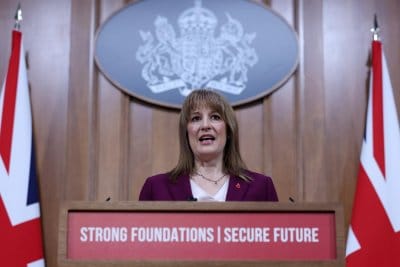
British Chancellor of the Exchequer Rachel Reeves delivers a rare pre-budget speech Tuesday at her official residence at No. 9 Downing Street, London, in which she suggested tax hikes were unavoidable. Photo by Andy Rain/Pool/EPA
Nov. 4 (UPI) — British Chancellor Rachel Reeves signaled Tuesday that she was likely to raise taxes on ordinary people in her upcoming budget this month in spite of an election pledge by the Labour government it would not do so.
In a speech in Downing Street, Reeves said she would make “the choices necessary” to ensure the foundation of the economy was sufficiently strong for the government to deliver on its mandate to protect the NHS, get down the national debt and rebuild the economy.
Notably, she did not repeat the manifesto pledge the party ran on in the 2024 general election, in which it swept to power to leave untouched the three main taxes — income tax, National Insurance and VAT.
Instead, seeking to explain her actions in advance of her watershed budget, which she will deliver to Parliament on Nov. 26, she said people needed to “understand the circumstances we are facing” and that everyone needed to do their bit to rectify the situation.
“As I take my decisions on both tax and spend I will do what is necessary to protect families from high inflation and interest rates, to protect our public services from a return to austerity and to ensure that the economy that we hand down to future generations is secure, with debt under control.
“If we are to build the future of Britain together, we will all have to contribute to that effort. Each of us must do our bit for the security of our country and the brightness of its future.”
Reeves dangled the prospect of rewards down the line, stating that getting it right now would yield more resilient public finances with the headroom to withstand global shocks, which in turn would provide businesses with the confidence to invest.
She said that would in turn leave the government with more leeway to act when necessary, investing in infrastructure and industry to build a stronger economy and get down the cost of government debt, spending less on interest and more and schools and the NHS.
Reeves is betting on the budget, her second, to win the endorsement of the market for her management of the country’s finances by showing she can stick to the fiscal rules she set for herself in October 2024.
Those rules state she must balance spending with revenue — within a plus or minus margin of 0.5% of GDP — within five years, meaning no borrowing for everyday spending from the 2029-30 financial year onward. In addition, the ratio of government debt to GDP must begin falling within the same timeframe.
To do that, however, she must demonstrate how she plans to plug a fiscal hole of as much as $40 billion and boost lackluster economic growth.
The only options to close the gap and balance the books are a return to austerity — which the government has categorically ruled out — or boost the amount of money flowing into government coffers.
Reeves raised some taxes on business in her first budget in November 2024 and to come back for more after promising she would not do so, particulary when it comes to raising the basic rate of income tax — currently 20% — is very high risk, politically.
It hasn’t been done for 50 years and it didn’t work out well for then-Labour government with the country plunged into a currency crisis and forced to seek a bailout loan from the IMF.
Reeves mostly laid blame at the feet of the previous Conservative administration’s policies, including Brexit, austerity and cuts to infrastructure spending, all of which she said had led to falling productivity.
She also cited high inflation globally and economic uncertainty created by the trade tariffs imposed by U.S. President Donald Trump in recent months.
Conservative shadow chancellor, Mel Stride, said it was now certain tax hikes for families and businesses were on the way.
He said that if Reeves proceeded to go back on her word, she should quit.
Daisy Cooper, Treasury spokesperson for the Liberal Democrats, said the government could no longer dodge responsibility.
“It’s clear that this budget will be a bitter pill to swallow as the government seems to have run out of excuses,” she said.